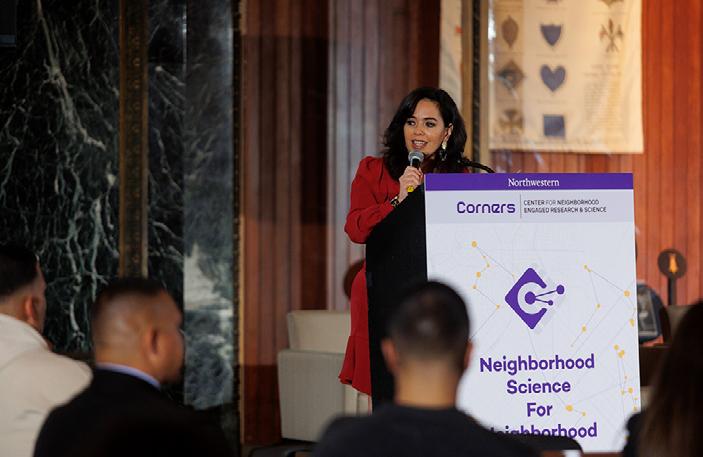
2 minute read
Manifesting, Measuring, and Mitigating Climate Change
IPR researchers focus on climate change’s human costs and climate justice
viable in even quite conservative states. Unlike carbon taxes, which produce less revenue over time as emissions are reduced, public benefit funds might even increase revenue as alternative fuel sources produced fewer emissions. Both are valuable tools for policymakers, she says, noting carbon taxes work best when taxed businesses have alternative fuel sources to shift to.
Advertisement
Tackling Climate Justice
Shifting and widening our perspective on climate change is a better way to address it, write IPR’s Kimberly Marion Suiseeya , a political scientist, and Beth Redbird, a Native American scholar and sociologist.
IPR researchers approach climate change from a social science perspective, with questions that tackle deep-seated social and political issues.
Climate Change Affects People’s Lives
IPR anthropologist Sera Young ’s research focuses on how people deal with water insecurity, and she explains that climate change may lead to too much water, too little water, or water of unacceptable quality.
Young and her colleagues assessed individuals’ experiences of water insecurity by surveying over 45,500 adults in 31 lowand middle-income countries. They find that roughly 14%—about 436 million of the 3 billion adults represented by the survey sample—experienced water insecurity.
Young and her collaborators’ development of the Individual Water Insecurity Experiences (IWISE) and Household Water Insecurity Experiences (HWISE) scales bring a badly needed “human voice” to the water sector. “We are making problems with water visible by counting experiences,” Young said.
Just as Young’s research shines a light on the impacts of climate change on ordinary people’s lives, IPR sociologist Julia Behrman shows how climate change may profoundly affect important life decisions.
She and her co-author demonstrate that adolescent girls who experienced droughts during the growing season in Malawi married or began living with a partner earlier and also began having children earlier. The finding implies that financial necessity pushed families to marry off their women at very young ages to have fewer people to feed or for the exchange of goods marriage brings. This finding exemplifies how the world’s poorest are more vulnerable to the weather extremes that climate change brings.
“I see climate change as inextricably linked to inequality,” Behrman said.
Addressing Climate Change
To reduce greenhouse gas emissions and reduce global warming, governments levy the carbon tax on those who create emissions; businesses and consumers may minimize their tax by switching fuels or using new technologies.
IPR sociologist Monica Prasad studies this tax and the little-known but similar “public benefit funds.” Her research shows that the benefits of carbon taxes in the U.S. are underestimated.
Public benefit funds, currently in place in 22 states plus the District of Columbia and Puerto Rico, are assessed when electricity is consumed by adding a charge to electricity bills. Carbon taxes are applied to emissions. The funds, Prasad points out, give consumers an incentive to reduce their use of electricity—unlike a carbon tax.
Prasad calculates public benefit funds have reduced carbon emissions and are politically
“Traditional knowledge draws on generations of ongoing, empirical observations of the complex interdependencies of our world, revealing insights into how climate change impacts not only parts of the system, but the system as a whole—phenomena that the scientific method rarely, if ever, captures,” Suiseeya said.
For example, if the Ojibwe people’s staple manoomin—or wild rice—were to disappear due to habitat loss and degraded water quality, the researchers write, it would “precipitate the displacement and ultimate decline of Ojibwe identities, lifeways, ways of being, and ways of knowing, the very existence and practices that are spiritually rooted in manoomin.” Such a catastrophe exemplifies climate injustice, the disproportionate suffering of climate change. Suiseeya and her colleagues have taken an important step towards enacting their goal of bringing together scientific and traditional knowledge with a new five-year program supported by the National Science Foundation, “Strengthening Resilience of Manoomin, the Sentinel Species of the Great Lakes, with Data-Science-Supported, Seventh Generation Stewardship.”
Julia Behrman is assistant professor of sociology. Monica Prasad is professor of sociology. Kimberly Marion Suiseeya is assistant professor of political science and of environmental policy and culture. Sera Young is associate professor of anthropology and global health. All are IPR faculty.










